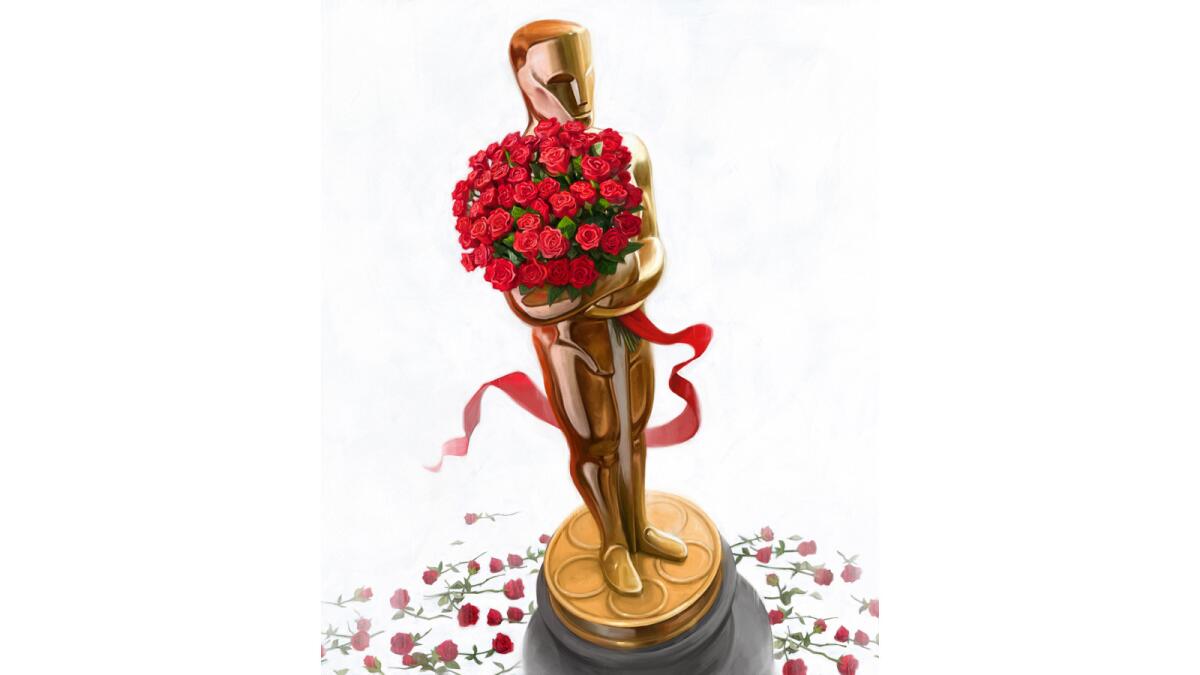The film academy? Far from perfect. The Oscars? Irresistible

- Share via
I ran into a director I know at Sundance a few weeks ago, and he had a bone to pick with me, and not the expected one, about my recent book “Not to Be Missed: 54 Favorites From a Lifetime of Film.”
The filmmaker wasn’t disturbed by my choices, which is usually the issue; he wanted to know something else: Why had I so frequently mentioned how the movies I’d written about had done in their races for Academy Awards?
Busted.
Time and again, with films as far apart chronologically as 1941’s “The Lady Eve” and 2011’s “Footnote,” whether the results were positive or negative, I talked about how a particular motion picture or its key creative personnel had fared with Oscar voters. I’d done it so often I’d noticed it myself in the editing process and wondered if I was going to the well too often.
FULL COVERAGE: Oscars 2015
Though the director was too polite to say it, the implication of his question was clear: Didn’t I know the history of the organization, the often venerable age and largely uniform racial makeup of its members, how unadventurous their taste has frequently been? In short, didn’t I know how fallible an indicator of true quality the Academy Awards were? And if I did know, why was I using the Oscars as a yardstick?
As someone who has thought and written about the Academy of Motion Picture Arts and Sciences for decades, I definitely knew what he was talking about.
I knew, for instance, that one reason the academy had been founded in 1927, as Oscars authority Robert Osborne has written, was not necessarily to seek out and reward quality but “to counter the unfavorable publicity focusing on the film industry at the time.”
I knew that in the heyday of the studio system, pressure from moguls had led to accusations of bloc voting. I knew all about the academy decisions that seem questionable in retrospect, like only two nominations for the beloved “Singin’ in the Rain” and no directing Oscar ever for Stanley Kubrick or Alfred Hitchcock.
I also know, and this is the heart of the matter, that in the final analysis the Oscar represents, as any award does, not any absolute standard of excellence or quality but the particular taste of a finite group of people at a specific time and place.
Given all that, why do I care so much about who wins the Oscars, not only this particularly hard-to-predict year but in the past as well? My passion may be paradoxical, but there are reasons for it.
One cause is that the Oscars, like any self-respecting cause, got to me young. My parents enjoyed watching, and I picked up the habit from them. The movies were one aspect of America that appealed to my extended immigrant family, especially my aunt Sarah (the woman who regularly refused relatives’ pleas for second helpings at Thanksgiving, but that’s another story). When the show started and the stars arrived, I remember her beaming at the TV and saying, “Ah, here they are, my friends.”
One thing that appealed to me then, and still does, is that the Oscars have quite a history, more than 85 years and still going strong. They have meant something to generations of individuals, to distant fans as well as the stars of Hollywood’s golden age, which in turn means something to me. Plus, talking about how well or how poorly a film did in the voting helps locate it in the specific moment it came out.
OSCARS 2015: Complete list | Ballot | Cheat Sheet | Top nominees | Presenters | Timeline
Though people in the business tend to be cynical and dismissive about all awards, I’ve discovered that this is not the case elsewhere. I had the opportunity to interview the Polish director Andrzej Wajda, one of the world’s transcendent filmmakers by any standard, when he won an honorary Oscar in 2000, and he was plainly grateful for the award, which he proudly told me the Polish government planned to put on public display next to Lech Walesa’s Nobel Prize for Peace.
The Oscars mean something because, and this of course is what sets them apart from other awards that shall go nameless, they are given by a cross section of people from different crafts who actually make movies. The members I know take their responsibility seriously, attempting to see all the nominated films before they vote, and though the omnipresence of DVD screeners has cut into theatrical viewing, it’s also leveled the playing field and made independent films such as “Boyhood” and “Whiplash” into real players. Even if the group’s taste is not always mine, I am always interested in what they have to say because they are speaking from a place of experience.
More than that, because the Oscars are the face the movie industry I am passionate about presents to the world, I want the voters to make choices that I feel reflect well on its mandate. When it unaccountably neglects an outstanding film, either in what wins or what is nominated, for instance the way the foreign-language committee criminally ignored Sweden’s “Force Majeure,” I hate to see it losing face.
Though I understand that their taste is particular, I always want to know where academy voters have landed in the past and where they’ll end up in the present. Will it be “Boyhood”? “Birdman”? “American Sniper”? Something else entirely? Only one thing is certain: I will be watching.
Twitter: @kennethturan
More to Read
Only good movies
Get the Indie Focus newsletter, Mark Olsen's weekly guide to the world of cinema.
You may occasionally receive promotional content from the Los Angeles Times.










